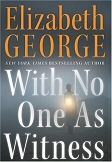 Elizabeth George, an American who sets her crime novels in England, doesn't
lack for courage. She trusts readers to pay close attention to her hefty,
complex, smart books. She's also not afraid (as our British cousins say) to
throw a spanner in the works; there are some surprises in the closing pages of
"With No One As Witness," and they're doozies.
Elizabeth George, an American who sets her crime novels in England, doesn't
lack for courage. She trusts readers to pay close attention to her hefty,
complex, smart books. She's also not afraid (as our British cousins say) to
throw a spanner in the works; there are some surprises in the closing pages of
"With No One As Witness," and they're doozies.The book is the latest in George's long-running series about New Scotland Yard's Thomas Lynley and his colleagues. Someone is killing teenage boys in London, and the grisly crimes, once the police realize their connectedness, form a political hot potato - not least because most of the victims came from minority populations.
The investigation soon spreads far beyond nailing a single killer. Issues of racism and prejudice in the police force are raised. The terrifying problems of at-risk kids adrift in a big city come into tight focus. And the case has bittersweet, life-changing ramifications
for George's three main characters.
Lynley, who long age, forsook a blue-blooded heritage to pursue his career as a cop, is deliriously happy in marriage and anticipating the birth of his child. Bright. young Winston Nkata, having overcome an unpromising early adulthood, has recently been promoted, but he's uncomfortably aware that his high profile role in the investigation exists because the police brass want to show the public a black cop's face. And Barbara Havers, abrasive and chronically untidy, is struggling to regain lost ground, both in her career and her personal life.
All three must bear up under incompetent, counterproductive higher-ups. And all three are saddled with the unwanted attentions of journalists and psychological profilers. George, a part-time Seattle-area resident, has created a less intricate structure for "With No One As Witness" than for the last entry in the series, "A Traitor to Memory." But the new book is just as delicately textured, just as achingly compassionate, and just as gripping. Perhaps even more so; it's one of George's best, and that's saying something.